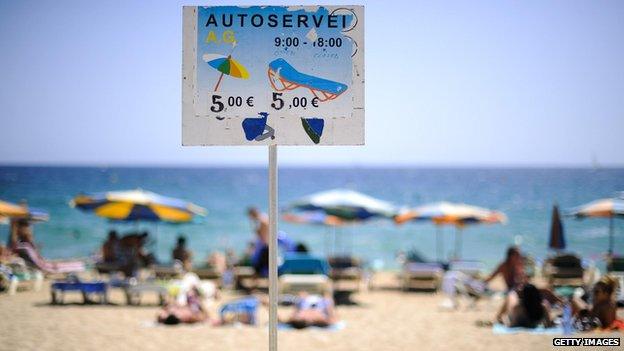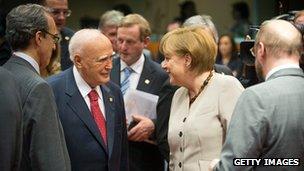Why has Spain fallen out of love with the European Union?
- Published

Since 2007, Spanish approval of the EU has almost halved. On an Andalusian beach, one hard-pressed couple explain why their attitudes have shifted so dramatically.
It is already 30C (86F) on the beach at Torre del Mar and Maria Dolores and her husband Jose are getting a little crabby with each other as they un-stack the plastic sun loungers from the shed.
Jose stumbles backwards into the dog's water bowl and curses.
He is tired and hot and he does not want to be Jose The Sun Bed Man today - he prefers being Jose The Civil Servant in the coolness of an air-conditioned office - but since his hours and wages were slashed two years ago, he needs this sideline to make ends meet.
"Why can't they cut jobs at the top rather than the bottom?" he mutters as he unchains the loungers.
"It's always cuts, cuts, cuts. I know we have a big debt in Spain but the pressure we're under to pay it back so quickly is crippling us."
Maria Dolores takes money from a tanned, bikini-clad tourist and speaks loudly and slowly to her, pointing to the sun and making signs to show the woman that it is very, very hot today and she must not get burnt.
"She is a nice lady, that one," she tells me. "Even if she is German. Not like that Merkel woman."
Jose snorts. He is not a fan of the German Chancellor either, he says - and nor is he a fan of that European Union she runs.
Torre del Mar, like the rest of Andalusia, has greatly benefited from Spain's entry into the EU in the mid-1980s.
The long, paved promenade with its palm trees, cycle lanes and beach bars was paid for largely through EU grants - EU money is behind countless schools, roads and restoration projects in the region.
As Spain emerged, under-developed and economically weak, from the isolation of the Franco dictatorship, the EU was seen as its benevolent benefactor.
Now, six years into an economic crisis which has left 27% of the population unemployed, it is viewed as the belligerent bully which is forcing Spain to its knees with austerity measures.
Since 2007, Spanish approval of the EU has almost halved.
Just down the coast in a nearby park, a group of elderly men play petanca, a form of boules, in the shade.
The heavy silver balls flash sparks of sunlight as they roll towards the dusty jack and smack against each other with a satisfying thock.
A rumble of irritation goes round the group as the big, wheezing Antonio wins again, spitting on his handkerchief and wiping his flushed face.
"Oh, give someone else a bit of the glory," chides Miguel, a white-haired and sprightly man of 70.
These men remember what it was like to live under Franco - and subsequently the boom times that followed, as the Spanish economy, fuelled by EU structural funds and a decade-long property bonanza, went from strength to strength.
"In those days, everything seemed possible," says Miguel sadly, "but now where has the all that money gone? The problem is the EU is no longer a collective, it's just different rules for each and every country."
Antonio smacks the silver balls against each other in irritation. "We are in crisis," he snaps.
"We need help but all Chancellor Merkel does is tell our Prime Minister to cut our deficit and our pensions." He lifts his arm and prepares to throw.
"Give me half a chance," he mutters, and I would cut the damn lot of those EU politicians - we did not elect them."

European leaders meeting in Brussels have agreed to spend over £7bn on job creation
The heat has intensified as I leave the park and seems to have taken the locals by surprise.
Many bear angry red stripes of sunburn down their legs and backs and everyone looks sticky and a little fractious.
Back on the beach, Maria Dolores is cutting a piece of ham to offer to the couple of scraggy dogs, which are skulking under the picnic table.
One of them, smelling the meat, jumps up quickly, sending a gritty cloud of grey sand onto Jose's feet. He curses irritably and Maria tuts at him reproachfully.
"They are our children's dogs," she explains. "Both our boys have gone to England to find jobs - they are working there as waiters now.
"When I speak to my sons on the phone I can hear they're homesick but of course they can't come back here because there's nothing for them in Spain."
She pats the dog's head and says quietly: "This is all I've got left of my family."
How to listen to From Our Own Correspondent, external:
BBC Radio 4: Saturdays at 11:30 and some Thursdays at 11:00
Listen online or download the podcast.
BBC World Service: Short editions Monday-Friday - see World Service programme schedule.
You can follow the Magazine on Twitter, external and on Facebook, external